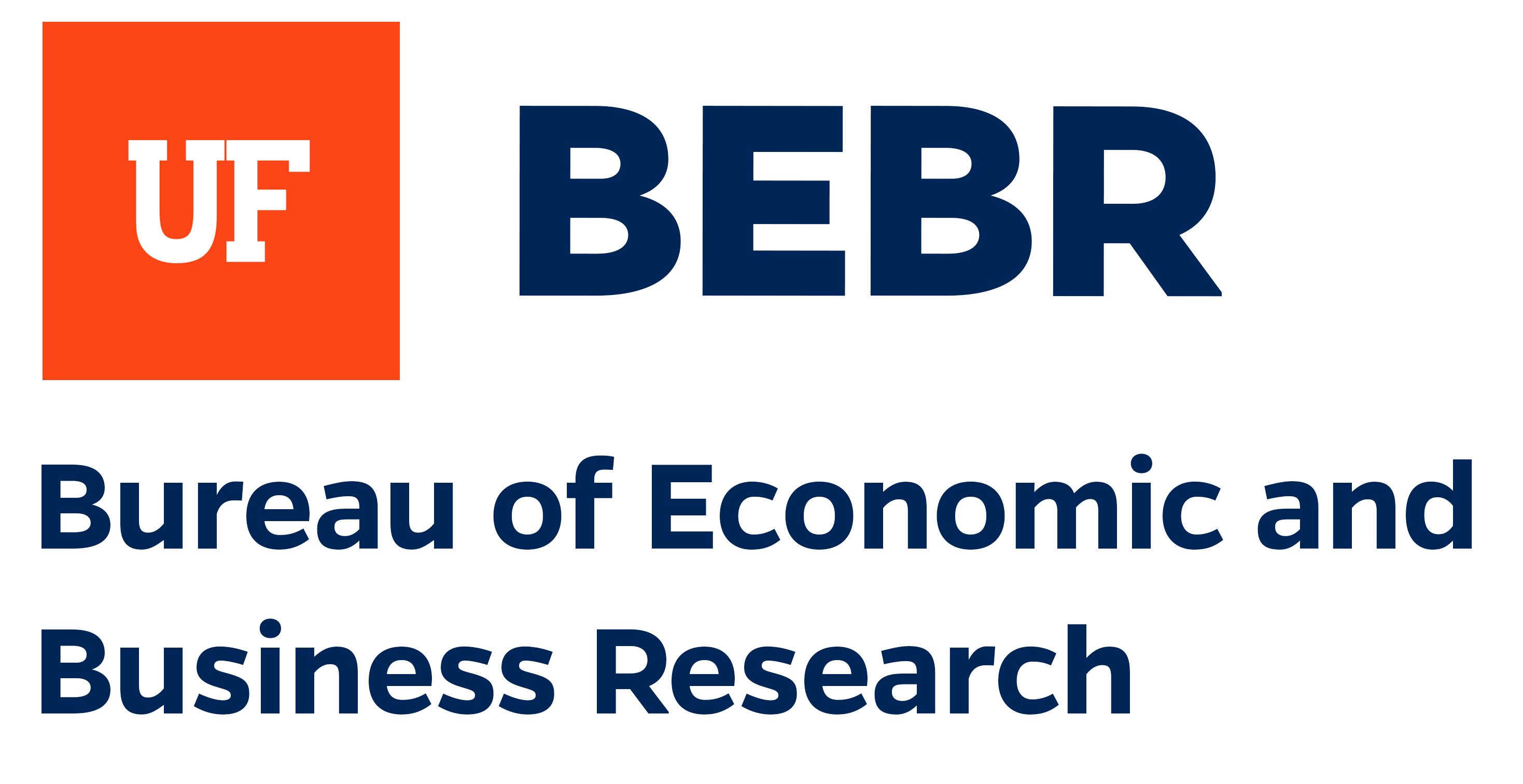SOCIAL NETWORKS
The Bureau of Economic and Business Research Social Networks program focuses on network analysis research in order to foster interdisciplinary collaboration, provide analysis tools, and enhance research productivity.
The Bureau of Economic and Business Research Social Networks program focuses on network analysis research in order to foster interdisciplinary collaboration, provide analysis tools, and enhance research productivity.
BEBR’s Social Networks Program offers personal and professional network analysis and visualization, as well as recommendations for network interventions.
In the area of academic research, collaboration is an essential aspect of work, and research networks are at the center of such. Studying these networks helps monitor and drive research productivity in the university setting.
In 2012, BEBR and the UF Clinical and Translational Science Institute (CTSI) began a project aimed at mapping, visualizing, analyzing, and shaping collaboration networks at UF. Since then, BEBR has collaborated with several entities at UF in creating network profiles and network intervention studies. These activities have resulted in multiple published articles and presentations at international conferences.

BEBR’s Social Networks Program offers personal and professional network analysis and visualization, as well as recommendations for network interventions.
In the area of academic research, collaboration is an essential aspect of work, and research networks are at the center of such. Studying these networks helps monitor and drive research productivity in the university setting. In 2012, BEBR and the UF Clinical and Translational Science Institute (CTSI) began a project aimed at mapping, visualizing, analyzing, and shaping collaboration networks at UF. Since then, BEBR has collaborated with several entities at UF in creating network profiles and network intervention studies. These activities have resulted in multiple published articles and presentations at international conferences.

NETWORK ANALYSIS HUB
The University of Florida serves as a central force in network analysis research and service projects, with the BEBR Social Networks program as an integral component of this dynamic community. Comprised of an interdisciplinary assembly of students, faculty, and staff who share a profound interest in social network theories and methodologies, BEBR’s Social Networks Program provides both personal and professional network analysis and visualization services, along with recommendations for network interventions. This program holds great significance in the realm of academic research, as collaboration frequently unfolds within teams and through understanding potential networks of researchers. By scrutinizing these intricate networks, we can effectively monitor and catalyze research productivity within the academic sphere.
Since its inception in 2012, the BEBR Social Networks Program has collaborated extensively with various entities at UF, including the Center for the Humanities and the Public Sphere, the UF-FAMU-USC CaRE² Health Equity Center Program, and the Biodiversity Institute, among others. These partnerships have yielded a wealth of published articles and presentations at esteemed international conferences. BEBR’s Social Networks Program plays a pivotal role in supporting network analysis and intervention studies at the University of Florida.
BEBR’s social networks analysis explores an extensive range of research topics, including health & wellness networks, academic & research networks, and community & social impact networks.
Explore a diverse range of topics, including health and wellness networks, academic and research networks, and community and social impact networks, within the field of social network analysis with BEBR.
Explore a diverse range of topics, including health and wellness networks, academic and research networks, and community and social impact networks, within the field of social network analysis with BEBR.
Health & Wellness
This includes research on how social networks influence health-related behaviors, such as smoking, substance abuse, and obesity. It may also explore the support networks of individuals facing health challenges and the impact of these networks on their well-being.
This includes research on how social networks influence health-related behaviors, such as smoking, substance abuse, and obesity. It may also explore the support networks of individuals facing health challenges and the impact of these networks on their well-being.
Academic & Research
The program investigates collaboration networks among researchers, both within the University of Florida and in broader academic and scientific communities. This can involve analyzing co-authorship networks, interdisciplinary research collaborations, and the dissemination of academic knowledge.
The program investigates collaboration networks among researchers, both within the University of Florida and in broader academic and scientific communities. This can involve analyzing co-authorship networks, interdisciplinary research collaborations, and the dissemination of academic knowledge.
Community & Social Impact
Research in this area focuses on understanding the structure and dynamics of social networks within communities. This approach includes studying the spread of information, social support systems, and the influence of social networks on community-based interventions and initiatives.
Research in this area focuses on understanding the structure and dynamics of social networks within communities. This approach includes studying the spread of information, social support systems, and the influence of social networks on community-based interventions and initiatives.
SOCIAL NETWORKS
The BEBR Social Networks program has successfully undertaken noteworthy collaborative projects in recent years. These projects include partnering with esteemed organizations including:
- National Institute of Health (NIH)
- National Institute of Health – National Center for Advancing Translational Sciences (NCATS)
- National Cancer Institute (NCI)
- National Science Foundation (NSF)
- National Institute on Alcohol Abuse and Alcoholism (NIAAA)
- UF Center for Humanities and the Public Sphere (UF CHPS)
- UF Clinical and Translational Science Institute (UF CTSI)
- UF-FAMU-USC CaRE² Health Equity Center Program
- UF Biodiversity Institute
- University of Kentucky Center for Clinical and Translational Science
- University of Miami Clinical and Translational Science Institute
- University of Kentucky Center for Clinical and Translational Science
These projects encompass a wide range of topics, such as exploring the impact of online training on smoking relapse to investigating social networks to analyze the influence of social network size, among numerous others. As always, subject matter is entirely dependent on the scope of the project, which reflects BEBR’s commitment to advancing knowledge and making a meaningful impact in various research domains. The table below shows the diversity of previous projects, which have brought in over two million dollars in revenue to BEBR.
| FUNDING SOURCE / ORGANIZATION(S) | PROJECT TITLE |
|---|---|
| National Institutes of Health (National Institute on Aging) | Financial Impact of Support and Care in Alzheimer’s Disease and Related Dementias |
| BBVA Foundation | Mapping Cultural Diversity Through Personal Networks |
| National Science Foundation | Measuring the dynamic impact of personal social networks on language learning outcomes |
| National Institutes of Health / National Cancer Institute | Effect of Helpers Program On-line Training on Smoking Relapse and Social Networks |
| National Institutes of Health / National Cancer Institute | The Influence of Social Network Size, Composition and Function of Psychological Outcomes of Pediatric Cancer Caregiving |
| National Science Foundation | Extreme Weather Events and Individual differences in Threat Perception and Behavior |
| National Science Foundation | FW-HTF-RM: Collaborative Research: Future of Construction Work at the Human-Technology Frontier |
| National Institute on Alcohol Abuse and Alcoholism | Digital Motivational Behavioral Economic Intervention to Reduce Risky Drinking Among Community Dwelling Emerging Adults |
| National Science Foundation | Collaborative Research: RIPS Type 2: Vulnerability Assessment and Resilient Design of Interdependent Infrastructures |
| National Institutes of Health (National Center for Advancing Translational Sciences) | Clinical & Translational Science Institute / Network Science Program |
Within the field of social network analysis with BEBR, explore a diverse range of topics, such as health and wellness networks, academic and research networks, and community and social impact networks.
Within the field of social network analysis with BEBR, explore a diverse range of topics, such as health and wellness networks, academic and research networks, and community and social impact networks.
Explore a diverse range of topics, including health and wellness networks, academic and research networks, and community and social impact networks, within the field of social network analysis with BEBR.
Health and Wellness:
This includes research on how social networks influence health-related behaviors, such as smoking, substance abuse, and obesity. It may also explore the support networks of individuals facing health challenges and the impact of these networks on their well-being.
This includes research on how social networks influence health-related behaviors, such as smoking, substance abuse, and obesity. It may also explore the support networks of individuals facing health challenges and the impact of these networks on their well-being.
Academic and Research:
The program investigates collaboration networks among researchers, both within the University of Florida and in broader academic and scientific communities. This can involve analyzing co-authorship networks, interdisciplinary research collaborations, and the dissemination of academic knowledge.
The program investigates collaboration networks among researchers, both within the University of Florida and in broader academic and scientific communities. This can involve analyzing co-authorship networks, interdisciplinary research collaborations, and the dissemination of academic knowledge.
Community and Social Impact:
Research in this area focuses on understanding the structure and dynamics of social networks within communities. This approach includes studying the spread of information, social support systems, and the influence of social networks on community-based interventions and initiatives.
Research in this area focuses on understanding the structure and dynamics of social networks within communities. This approach includes studying the spread of information, social support systems, and the influence of social networks on community-based interventions and initiatives.
SOCIAL
NETWORKS
BEBR’s Social Networks program has successfully undertaken several noteworthy collaborative projects in recent years. These include partnering with esteemed organizations such as the National Institutes of Health National Cancer Institute, National Science Foundation, National Institute on Alcohol Abuse and Alcoholism, and the National Institute of Health (National Center for Advancing Translational Sciences). These projects encompass a wide range of topics, from exploring the impact of online training on smoking relapse [MOU16] and social networks to investigating the influence of social network size and composition on psychological outcomes in pediatric cancer caregiving. These involvements reflect our program’s commitment to advancing knowledge and making a meaningful impact in various research domains, as further exhibited in the table below.
| FUNDING SOURCE / ORGANIZATION(S) | PROJECT TITLE |
|---|---|
| National Institutes of Health (National Institute on Aging) | Financial Impact of Support and Care in Alzheimer’s Disease and Related Dementias |
| BBVA Foundation | Mapping Cultural Diversity Through Personal Networks |
| National Science Foundation | Measuring the dynamic impact of personal social networks on language learning outcomes |
| National Institutes of Health / National Cancer Institute | Effect of Helpers Program On-line Training on Smoking Relapse and Social Networks |
| National Institutes of Health / National Cancer Institute | The Influence of Social Network Size, Composition and Function of Psychological Outcomes of Pediatric Cancer Caregiving |
| National Science Foundation | Extreme Weather Events and Individual differences in Threat Perception and Behavior |
| National Science Foundation | FW-HTF-RM: Collaborative Research: Future of Construction Work at the Human-Technology Frontier |
| National Institute on Alcohol Abuse and Alcoholism | Digital Motivational Behavioral Economic Intervention to Reduce Risky Drinking Among Community Dwelling Emerging Adults |
| National Science Foundation | Collaborative Research: RIPS Type 2: Vulnerability Assessment and Resilient Design of Interdependent Infrastructures |
| National Institutes of Health (National Center for Advancing Translational Sciences) | Clinical & Translational Science Institute / Network Science Program |
CONTACT BEBR SOCIAL
NETWORKS PROGRAM
CONTACT BEBR
SOCIAL NETWORKS




